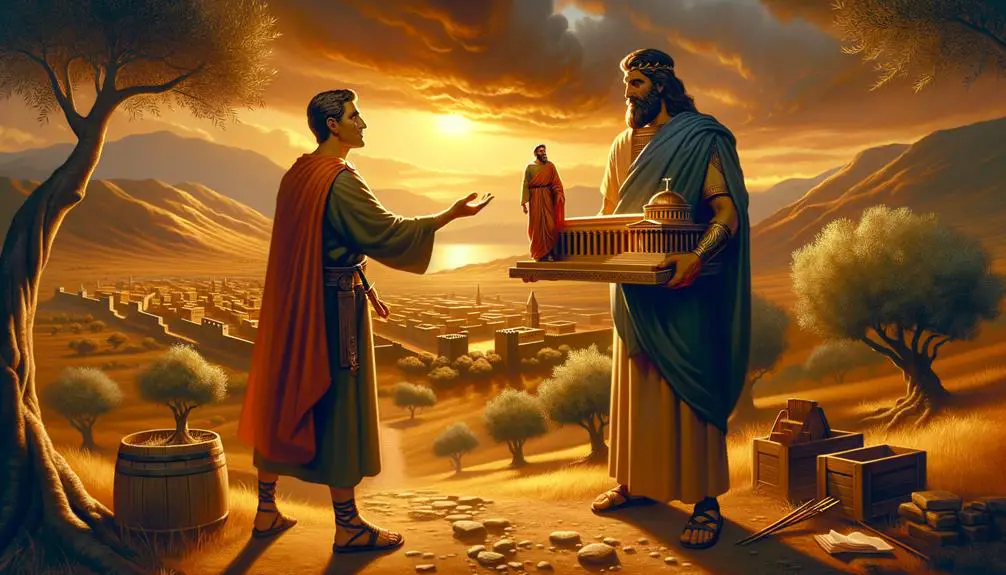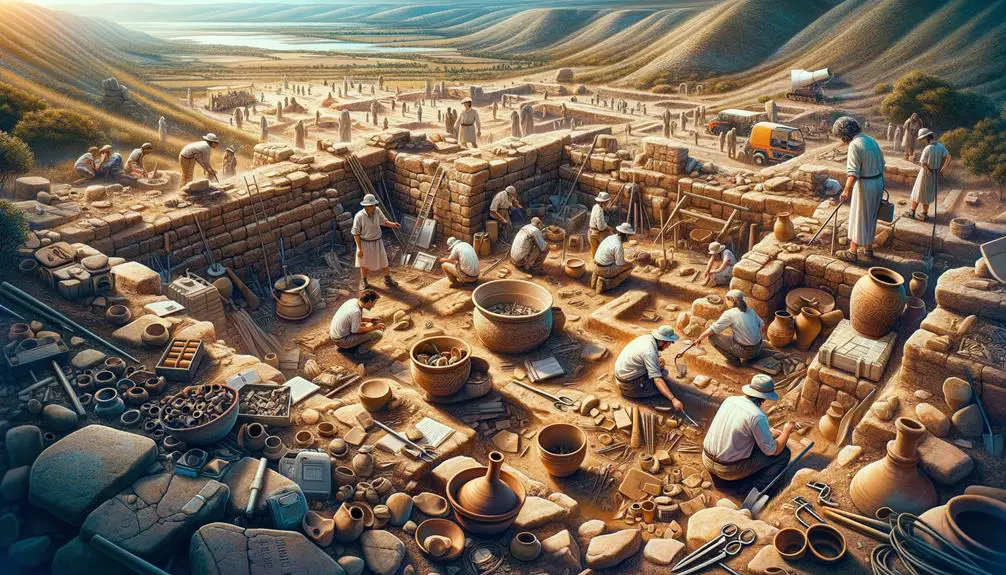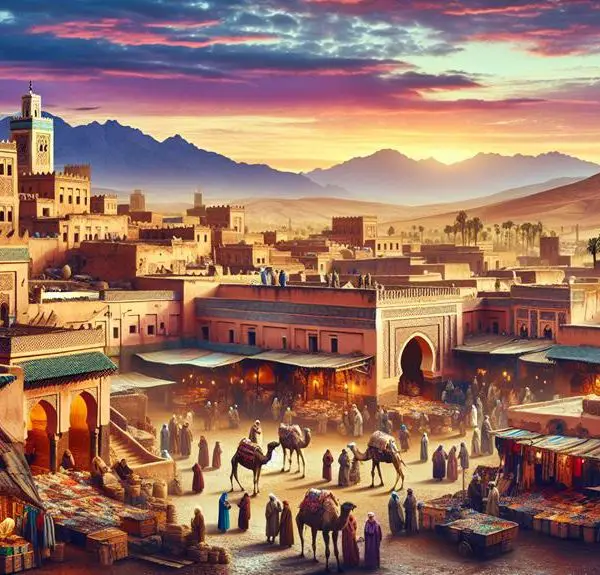Learn about Ziklag's enigmatic role in David's saga, where loyalty and intrigue intertwine, urging a deeper exploration of its biblical significance.

Ziklag in the Bible
When you explore the narrative of David seeking refuge in Ziklag, you uncover a story rich in themes of loyalty, betrayal, and divine intervention. This ancient city, gifted to David by King Achish of Gath, became a pivotal backdrop for events that would shape the course of Israel's monarchy.
As you consider Ziklag's dual role as a place of sanctuary and a stage for conflict, questions arise about its historical authenticity and its significance in biblical history. This intriguing mix of archaeological mystery and scriptural storytelling invites you to ponder further the layers of meaning behind David's sojourn in Ziklag.
Key Takeaways
- Ziklag holds archaeological evidence aligning with biblical narratives, enhancing its historical significance.
- It served as a crucial sanctuary for David, marking a pivotal chapter in his journey to kingship.
- The site's strategic location underlined its importance in ancient diplomatic and military maneuvers.
- Discoveries at Ziklag contribute to our understanding of cultural practices and the historical context of biblical stories.
The Historical Ziklag

Ziklag, a biblical city of significant historical intrigue, has been the subject of extensive archaeological investigation, revealing its complex past within the narratives of ancient Israel. Pinpointing the Ziklag location has engaged scholars in a rigorous debate, reflecting the city's elusive presence in historical records. The endeavor to locate Ziklag is fraught with excavation challenges, primarily due to the region's layered historical occupations and the transient nature of ancient settlements.
You'd find that identifying Ziklag involves sifting through the Negev desert's archaeological layers, where multiple sites vie for authenticity. The debate centers on distinguishing Ziklag's unique archaeological signature from surrounding Canaanite and Philistine settlements. This task is compounded by the limited textual references available, requiring a careful analysis of pottery, settlement patterns, and historical stratigraphy to argue for a site's candidacy.
Excavation challenges aren't merely technical. The shifting sands and erosion over millennia have obscured potential landmarks, complicating efforts to match biblical descriptions with physical evidence. Archaeologists must navigate these difficulties, employing advanced technologies like ground-penetrating radar and aerial surveys to uncover hidden structures that could hint at Ziklag's precise location.
Your appreciation for the quest to find Ziklag grows as you understand the meticulous effort required to reconcile biblical narratives with tangible evidence. This journey into the past isn't just about locating a city; it's about piecing together the fragmented history of ancient Israel, offering insights into the lives, cultures, and geopolitical dynamics of its peoples. The pursuit of Ziklag, therefore, stands as a testament to the enduring quest for historical and biblical understanding.
Ziklag's Biblical Significance
You'll find Ziklag's biblical significance deeply intertwined with its historical context, providing a backdrop for pivotal biblical narratives.
It served as David's refuge, a place of strategic importance and personal transformation, during a tumultuous period marked by his evasion of King Saul.
Furthermore, Ziklag's archaeological evidence offers tangible connections to these ancient stories, reinforcing its role in biblical history and scholarship.
Ziklag's Historical Context
Within the tapestry of biblical history, Ziklag holds a pivotal role, serving as the backdrop for key narratives involving David during his period of refuge from King Saul.
The Ziklag location, strategically nestled at the border of Judah and Philistia, offered a unique vantage point for cultural and military interactions. Its positioning allowed it to become a melting pot of cultural implications, influencing the socio-political landscape of the era.
Ziklag's significance extends beyond its geographical attributes; it symbolized a place of transition, where allegiance and identity were both tested and forged. This city's historical context isn't just a backdrop but a dynamic character in the unfolding biblical narrative, highlighting the complex interplay of culture, politics, and personal destiny in ancient Israel.
David's Refuge at Ziklag
Building on its historical significance, Ziklag served as David's sanctuary, where his leadership was both challenged and affirmed during his flight from King Saul. Amid Saul's relentless pursuit, David sought refuge in Ziklag, a strategic move that marked a pivotal chapter in his journey to kingship.
However, this period wasn't without its trials. The Amalekite attack on Ziklag tested David's resolve and leadership. In the face of adversity, he demonstrated remarkable resilience, rallying his men to recover what was lost. This incident not only solidified his role as a leader but also underscored the town's significance in his narrative.
Ziklag, thus, stands out as a symbol of refuge and recovery, highlighting a critical moment where David's destiny was both challenged and ultimately forged.
Ziklag's Archaeological Evidence
The quest to unearth Ziklag's location has captivated archaeologists, offering tangible links to its biblical narrative and deepening our understanding of its historical context. Excavation techniques and dating methodologies have been pivotal in piecing together Ziklag's past, shedding light on its significance.
- Excavation Techniques: Employing advanced tools and methods to uncover the layers of history buried within the site.
- Dating Methodologies: Utilizing radiocarbon dating and stratigraphy to pinpoint the era of Ziklag's occupation.
- Archaeological Findings: Artifacts and structures that align with descriptions from biblical texts, affirming its historical reality.
- Historical Context: Insights into the cultural and political landscape of the period, providing a backdrop to the biblical stories.
These elements collectively deepen our appreciation for Ziklag's role in both history and faith.
David's Refuge in Ziklag
You'll find that Ziklag's strategic significance wasn't merely geographical but also played a pivotal role in David's journey to kingship.
During his time in Ziklag, David utilized its position to foster alliances and consolidate his power base.
This period not only highlights the tactical acumen of David but also underscores Ziklag as a crucial refuge during a tumultuous chapter of his life.
Ziklag's Strategic Importance
Nestled strategically at the crossroads of ancient trade routes, Ziklag served as an invaluable refuge for David, providing a secure base from which he could navigate the complexities of his fugitive status. Its location wasn't just a matter of convenience but a crucial factor in the geopolitical dynamics of the time.
- Trade routes: Controlled access to vital commerce and information channels.
- Geopolitical dynamics: Positioned David amidst the political chessboard of regional powers.
- Refuge: Offered a safe haven from Saul's pursuit.
- Base of operations: Enabled strategic military and diplomatic maneuvers.
Understanding Ziklag's strategic importance illuminates why this location was pivotal for David. It wasn't just a place to hide; it was a power move in the ancient Near East's intricate political landscape.
David's Time in Ziklag
During his time in Ziklag, David found not just refuge but also a strategic base that significantly influenced his rise to power. Fleeing from Saul's relentless pursuit, Ziklag offered David a sanctuary, yet it was far from a peaceful haven.
It was here that David's leadership was truly tested, particularly during the Amalekite attack. This incident wasn't just a skirmish; it was a pivotal moment that cemented David's status as a leader capable of protecting his followers and recovering their losses.
Ziklag's role in David's narrative isn't just about escape; it's about the transformation from a fugitive to a figure of authority, demonstrating resilience in the face of adversity and the strategic acumen to turn setbacks into stepping stones towards kingship.
The Gift From King Achish

King Achish of Gath bestowed Ziklag upon David as a strategic gift, marking a pivotal moment in the biblical narrative. This act wasn't merely a gesture of goodwill; it was a calculated move driven by Achish's motivations and diplomatic tactics. By granting Ziklag to David, Achish aimed to secure a buffer zone against his enemies and ensure David's loyalty. This gift, though seemingly generous, was imbued with deeper political and military implications.
- A Test of Loyalty: Achish's gift to David served as a litmus test for loyalty. By accepting Ziklag, David was indirectly pledging his allegiance to Achish, tying their fates together in the complex geopolitical landscape of the time.
- Strategic Positioning: Ziklag's location was of strategic importance. Situated at the border, it acted as a protective barrier for Gath, potentially absorbing any direct attacks from Achish's adversaries.
- Diplomatic Leverage: The gift increased Achish's diplomatic leverage among the Philistine lords. It showcased his ability to forge critical alliances, strengthening his position within the Philistine confederacy.
- Control Through Dependency: By making David dependent on his goodwill, Achish aimed to control David's actions, ensuring that they aligned with Gath's interests.
This sophisticated maneuver by Achish illustrates the intricate dance of diplomacy and strategy in the biblical era. It wasn't just a town being handed over; it was a chess move in the grand game of ancient Near Eastern politics, with each player keenly aware of the stakes involved.
Tales of Loyalty and Betrayal
Reflecting on Achish's strategic gifting of Ziklag to David, it's crucial to explore the ensuing dynamics of loyalty and betrayal that this decision ignited in biblical narratives. This pivotal moment not only reshaped the political landscape but also provided a fertile ground for examining warrior ethics and diplomatic strategies within the context of ancient allegiances.
You'll find that Ziklag became a backdrop for complex interactions among David, his followers, and surrounding nations. The loyalty David showed to his men and to Achish, despite the inherent conflict of interests, contrasts sharply with the betrayal he faced, not just from external enemies but from within his own ranks.
Here's a brief overview:
Aspect |
Loyalty |
Betrayal |
|---|---|---|
Warrior Ethics |
David's protection of his people |
Insurgents seeking to undermine his rule |
Diplomatic Strategies |
David's allegiance to Achish |
Achish's court doubting David's loyalty |
Internal Dynamics |
David's followers' unwavering support |
Dissenters within questioning his decisions |
External Relations |
Mutual respect between David and other leaders |
Neighboring territories exploiting Ziklag's vulnerability |
Analyzing these components, you'll appreciate how Ziklag serves as a microcosm for the broader themes of loyalty and betrayal. David's experiences there highlight the delicate balance between maintaining ethical warrior conduct and navigating the treacherous waters of diplomacy. This account underscores the timeless relevance of these ancient narratives, offering insights into the enduring complexities of human relationships and power dynamics.
Divine Intervention at Ziklag

At Ziklag, divine intervention played a pivotal role in guiding David's actions and decisions, illustrating the profound impact of spiritual forces on earthly matters. When you delve deeper into the narrative, you realize that this wasn't just a tale of survival; it was a masterclass in divine strategy against enemy tactics. David, faced with despair after the Amalekites' raid, sought guidance from the Lord, leading to a miraculous recovery of all that was lost. This instance wasn't merely about the physical retrieval of people and possessions; it was a demonstration of faith and reliance on divine wisdom to overcome seemingly insurmountable challenges.
- Guidance in Desperation: At his lowest, David didn't succumb to despair but turned to divine direction, showcasing the power of faith in desperate times.
- Insight into Enemy Tactics: The divine guidance received by David provided not just the location of his enemies but insight into their tactics, enabling a strategic and successful recovery.
- Miraculous Recovery: The retrieval of every person and possession without loss underscores the miraculous nature of divine intervention, highlighting that with faith, what seems lost can be fully restored.
- Spiritual Warfare: The battle wasn't just against the Amalekites; it was a spiritual warfare where divine intervention tipped the scales, affirming the supremacy of spiritual strategies over mere human plans.
This segment of Ziklag's history underscores a deeper meaning for you: in facing life's battles, seeking divine guidance can provide unparalleled wisdom and resources, turning what seems like an inevitable defeat into a miraculous victory.
Ziklag's Role in Israel's Monarchy
Building on the theme of divine intervention, Ziklag's strategic significance emerges further as we explore its pivotal role in the establishment of Israel's monarchy, shaping the political landscape of the era. Ziklag, initially a Philistine-controlled town, became a key player in the complex political chess game of ancient Israel due to its unique position at the crossroads of Philistine and Israelite territories. It was here that David sought refuge, aligning with the Philistines to evade King Saul's relentless pursuit, marking a turning point in the biblical narrative that would eventually lead to the establishment of his monarchy.
Ziklag's role in Israel's monarchy is multifaceted, serving as a sanctuary for David, a base for military operations, and a diplomatic asset in forging a Philistine alliance. This strategic alliance provided David with the necessary support and breathing room to consolidate his power, ultimately leading to his kingship over Israel.
Aspect |
Significance |
|---|---|
Sanctuary |
Ziklag offered David refuge from Saul's pursuit, serving as a secure base. |
Military Base |
It became a staging ground for David's operations, enhancing his reputation. |
Diplomatic Asset |
The Philistine alliance provided David with political leverage. |
Strategic Location |
Positioned between Philistine and Israelite territories, it was a critical asset. |
Monarchy Catalyst |
Ziklag's support was instrumental in David's rise to power. |
Ziklag's intricate role in the narrative underscores its importance not just as a geographical location but as a critical element in the divine orchestration of Israel's monarchy. Through its strategic significance, Ziklag helped shape the destiny of a nation and its leaders.
Archaeological Insights Into Ziklag

Delving into the archaeological insights of Ziklag offers a tangible connection to its biblical narrative, revealing layers of historical and cultural significance that have shaped our understanding of this ancient site. You encounter not just the echoes of ancient lives but also the meticulous efforts of archaeologists who navigate excavation challenges to piece together Ziklag's past.
Archaeological endeavors at Ziklag have faced numerous hurdles. The primary challenge lies in the site's extensive history of occupation and destruction, which complicates artifact dating and stratigraphic analysis. Despite these obstacles, researchers have unearthed findings that provide invaluable insights into the site's historical timeline and its inhabitants' way of life.
- Excavation challenges: The overlapping layers of habitation have necessitated a careful excavation approach to accurately identify and date the various periods of Ziklag's occupation.
- Artifact dating: Precise dating techniques have been crucial in distinguishing between artifacts from different eras, offering a chronological framework that aligns with historical and biblical records.
- Cultural artifacts: From pottery to tools, the artifacts found at Ziklag offer a glimpse into the daily life, trade, and technological advancements of its ancient communities.
- Stratigraphic analysis: This method has been instrumental in understanding the sequence of occupation and the events that led to the site's destruction and rebuilding.
These archaeological insights not only enrich our understanding of Ziklag's role in biblical history but also underscore the complexities and dedication involved in uncovering the past. Through careful analysis and interpretation, archaeologists continue to bridge the gap between the biblical text and historical reality, bringing to light the enduring legacy of Ziklag.
Frequently Asked Questions
How Has the Story of Ziklag Influenced Modern Cultural Works, Such as Literature, Film, or Art?
You're exploring how the tale of Ziklag has seeped into modern cultural works. Ziklag adaptations vary widely, from novels to films, even influencing art. Each work often embeds deep cultural symbolism, drawing from the story's themes of loyalty, loss, and redemption.
This influence isn't just a nod to historical narratives but a deliberate choice to evoke shared human experiences. Analyzing these adaptations, you'd find a rich tapestry of interpretation and reimagining across mediums.
Are There Any Specific Rituals or Religious Practices That Were Historically Associated With Ziklag by Ancient Communities?
You're peering into the past, searching for echoes of ancient rituals tied to specific locales.
In the sands of time, the Ziklag location whispers of its historical significance. Archaeological evidence, although scarce, suggests that communities once venerated this site through unique practices and ceremonies.
These findings offer a glimpse into the spiritual landscape, revealing how ancient peoples might've celebrated or honored this place through their religious observances.
How Do Different Jewish and Christian Denominations Interpret the Events That Took Place in Ziklag?
When examining interpretations of historical events, you'll find that Jewish and Christian denominations often diverge, influenced by archaeological evidence and interfaith dialogue.
These discussions enrich understanding but also highlight theological distinctions. For instance, while some view these events through a purely historical lens, others see divine intervention at play.
This variance underscores the complexity of interpreting ancient narratives, demonstrating how archaeological discoveries and theological perspectives shape our comprehension of history.
What Are the Environmental and Geographical Changes Ziklag Has Undergone Since Biblical Times?
Since time's passage, like water over stone, the landscape you're exploring has transformed. Archaeological discoveries indicate that what was once a bustling settlement has undergone significant environmental and geographical changes.
Climate impact has altered the terrain, shifting from fertile grounds to more arid conditions. You'll find that these shifts reflect a broader narrative of human and natural intervention, painting a detailed picture of the area's evolution from its early days to the present.
How Has the Perception of Ziklag's Moral and Ethical Lessons Evolved in Contemporary Religious Education?
In contemporary religious education, you'll find that the perception of leadership lessons and ethical ambiguity has significantly evolved. Educators now delve into the complexities of moral decisions, highlighting the nuanced nature of right and wrong.
They use these stories to teach about the importance of context in ethical dilemmas, encouraging you to think critically about leadership and morality.
This approach offers a more sophisticated understanding of ethics than simplistic, black-and-white interpretations.
Conclusion
In sum, Ziklag stands not just as a mere dot on the biblical map, but as a testament to the complex interplay of faith, power, and human nature.
Like a mirror reflecting the trials of David, it showcases themes of refuge, betrayal, and divine providence that resonate through time.
Its stones whisper tales of ancient loyalty and the quest for sovereignty, offering a glimpse into the epoch when kings and prophets walked the earth, shaping the destiny of Israel.



Sign up